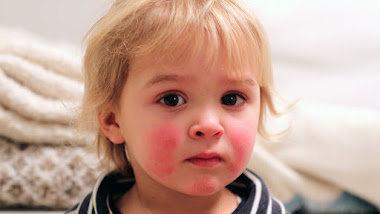The fifth disease is a fairly mild viral disease that commonly affects children.
It is also known as Erythema infectiosum or Parvovirus B19 or ‘Slapped cheek disease’.
Parvovirus B19 spreads through contact with infected respiratory secretions, which can either be through coughing or sneezing. It can also be passed from mother to unborn child but once a child has been infected, they become generally immune to the disease.
This disease usually appears as a red rash that makes the child’s cheeks look like they’ve been slapped, hence the name ‘Slapped cheek disease’.
It is listed as the fifth of the five common viral rash diseases of childhood, hence it is called the ‘Fifth disease’.
Symptoms
Symptoms are usually mild and may not be noticeable in your child.
It usually presents as a mild fever, headache, and runny nose.
Some days later, a bright red rash is likely to appear on the cheeks and over the next 2-4 days, a pink lacy rash appears on the trunk and limbs, which may become itchy.
The rash clears on its own in 7-10 days.
In some instances, a child may experience the body rash coming and going for several weeks which is generally brought on by sunlight or heat.
Other children, may experience joint pains though this is uncommon.
Children living with blood disorders such as sickle cell disease or spherocytosis may become anemic. At this stage, you should seek medical care for your child.
What is the incubation period?
The incubation period for this disease varies from 4-20 days. This is the time between a child being infected and developing symptoms.
Are there any complications?
As earlier mentioned, the rash is likely to return in children for a couple of weeks.
As the virus is known to affect the development of red blood cells, certain groups of persons are more at risk of complications, including,
- Women in the first half of pregnancy
- The fetus may develop anemia in fluid accumulation, which sometimes leads to miscarriage, although this rarely occurs
- For anyone who is immunosuppressed - chronic anemia may result and become difficult to treat
- Anyone with hemolytic anemia - they may develop severe anemia during the infection.
Treatment
The fifth disease is caused by a virus and therefore antibiotics do not work.
Treatment is aimed at managing the symptoms.
If the child is infected:
- Let them have enough rest and drink plenty of fluids
- You can give them paracetamol or ibuprofen if necessary, to relieve the fever and discomfort
Talk to your pharmacist before giving your child any drugs.
Dr. Favvy


Comments
Post a Comment